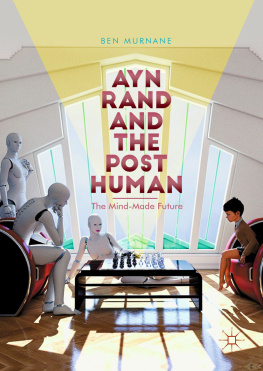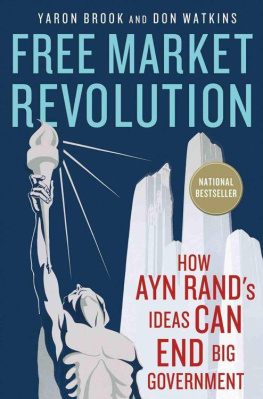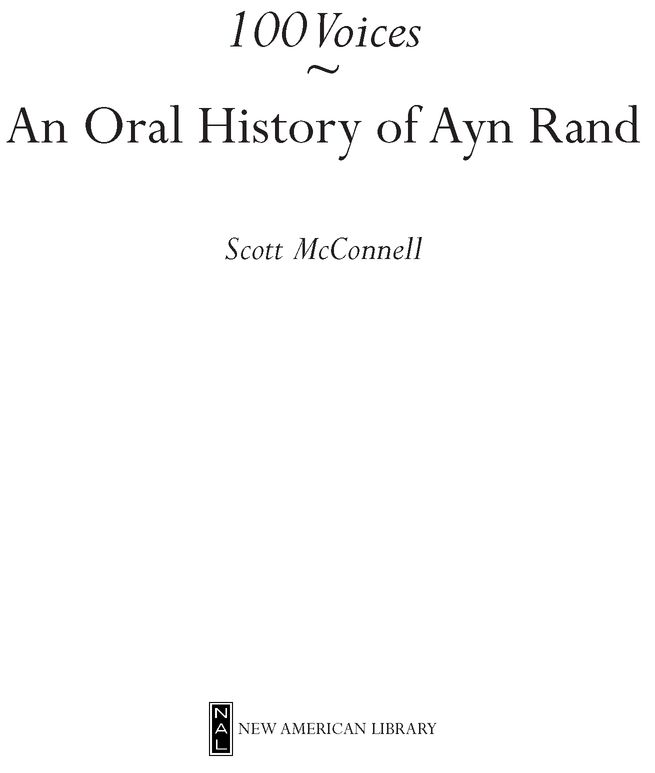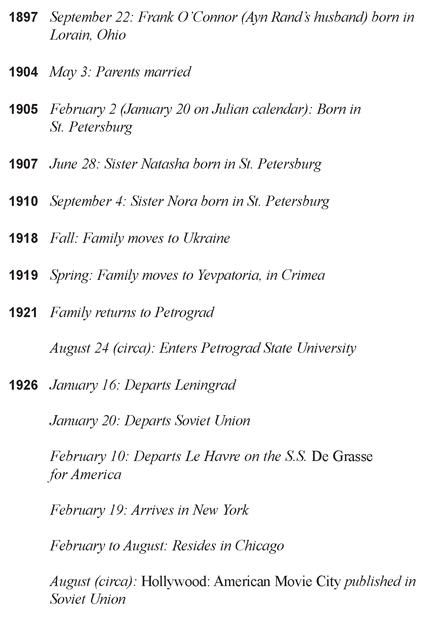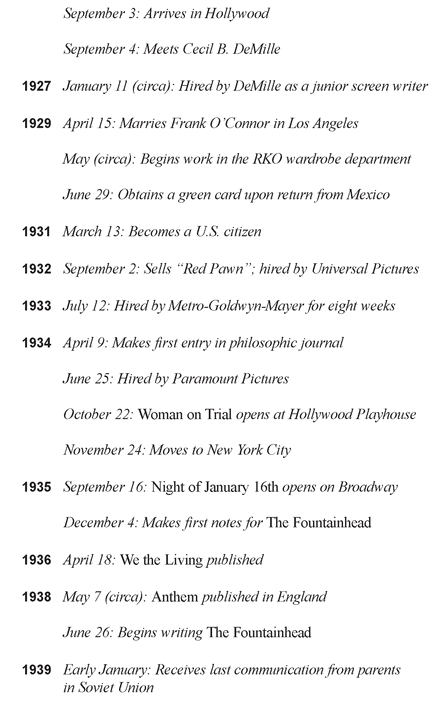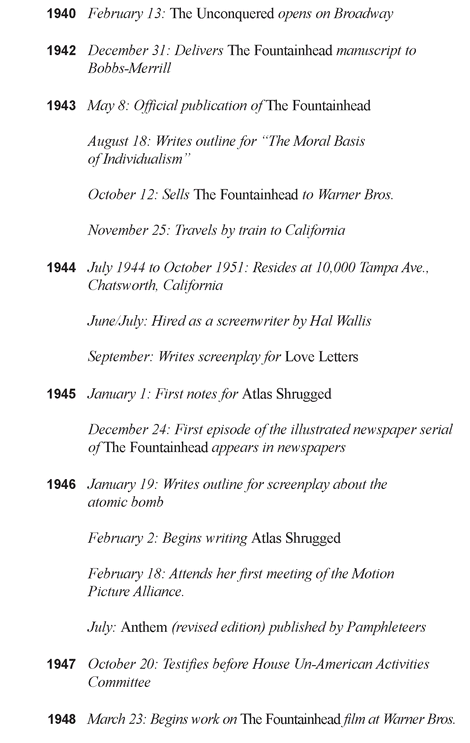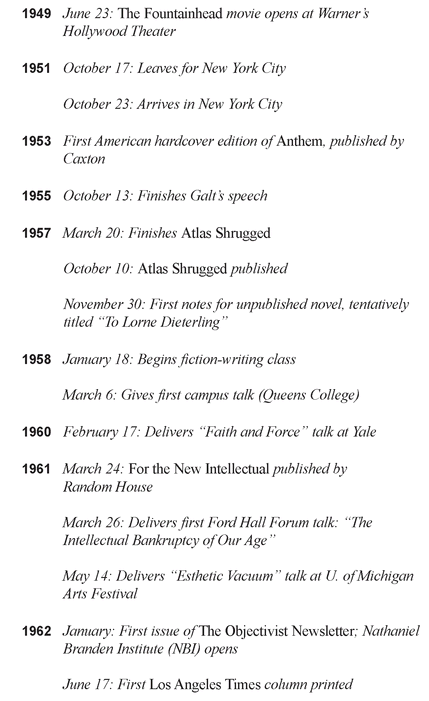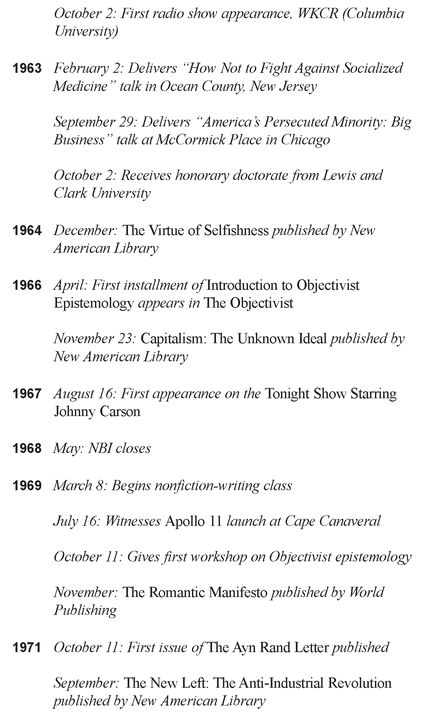Table of Contents
Preface
The Ayn Rand Oral History Program began in April 1996 as a project of the Ayn Rand Archives, a department of the Ayn Rand Institute. The purpose of the program was to gather and preserve knowledge about Ayn Rands life. It supplements the Archives collections of Ayn Rands personal papers and related materials in all media.
From 1996 to 2003, I tracked down and interviewed family members, friends and associates of Ayn Rands and edited their interviews. The first interview I conducted was of the woman who inspired the character Peter Keating in The Fountainhead. (See the 1930s chapter.) I conducted more than one hundred and sixty interviews, for a total of more than three hundred hours and approximately five thousand pages of raw transcript. Nearly all of the interviews were taped, with the vast majority being conducted over the phone. The shortest interview was three minutes; the longest was fifty-two hours (twenty-five phone meetings over a two-year period). Interviewee locations ranged across the globe, from Saint Petersburg, Russia, to Geneva, Switzerland; from New York to Los Angeles to Hawaii and Australia. All but two of the interviews were conducted by me, the exceptions being the interviews of Ayn Rands sister in Saint Petersburg and Ayn Rands French-speaking cousin in Switzerland, who were interviewed in their native languages, with questions I supplied.
I selected the interviews in this collection to cover a broad range of years, contexts, relationships and observations, and to supplement the limited number of reliable biographical sources available elsewhere. Not all the interviewees are fans; nor did they all admire Ayn Rand or agree with her ideas. Those interviewed provide new and valuable perspectives on Ayn Rand, and no interview has been previously published. The reader will hear Ayn Rands family, friends, fans, associates, doctor, dentist, lawyer and secretaries. Discussing her will be a former prime minister, a rock guitarist, Hollywood stars, TV celebrities, university professors, fiction writers and philosophers.
And while some interviewees discuss her ideas, this book focuses, not on philosophical issues or literature, but rather on Ayn Rands personal and business life. It focuses on the private Ayn Randthe Ayn Rand whom most people did not knowAyn Rand in her living room or study, at work, at a party, with her nieces, at the theater, or in her doctors or lawyers office. Covering almost seventy years from the mid-1910s to her death in 1982, topics and contexts discussed include Ayn Rand as employee, employer, friend, host, houseguest, portrait model, mentor, editor, lecturer, fiction writer, client, godmother and Playboy Club tour guide. The interviews reveal Ayn Rand angry, happy, betrayed, in love, fighting for her values, triumphant. They also show many aspects of her personality and the wide range of her values and life experiences.
I have organized the interviews in chronological order, and in order to better show Ayn Rands relationships and life and to support the storytelling drama of the remembrances, I did not break up the interviews into separate themes and topics.
The interviews in 100 Voices: An Oral History of Ayn Rand are edited extracts of the original oral interviews. From these I have cut many repeated stories and observations, but some repetition of content remains, in order to keep true to the persons relationship with Miss Rand, or due to the interviewees request. I edited these published transcripts to eliminate lack of clarity, wordiness or confusing grammatical slips and in many cases reorganized them for logic and/or drama. But I have kept the oral, conversational tone of interviews that reflect the individual voices of the interviewees and the content of their communication. It should be emphasized that every interviewee (or heir) approved his or her interview as published in this volume.
Because remembrances can be faulty, all statements of fact have (where possible) been checked for consistency with other interviews and material in Ayn Rands papers or in other document collections. But not every recollection can be affirmed and consistency does not guarantee accuracy. These are the thoughts and recollections of the interviewees. Neither I nor the Ayn Rand Institute necessarily agree with all the interviewees factual claims; inconsistencies have been identified and corrections of facts have been provided in footnotes where necessary. Other footnotes provide the historical background needed to understand an interviewees comment.
A project of this size and duration demands important thank-yous. First, to transcriptionists Larry Salzman, Marc Baer and Robert Benz, and to archivist Jeff Britting. To Simon Federman for his layout/production contributions. To Donna Montrezza for her proofreading, copyediting and design contributions. To Alexander Lebedev and Irina Chabatayeva, whose research work in Russia made the interviews of Ayn Rands sister possible. And especially to Michael S. Berliner, not only for his editorial assistance, but, as the Ayn Rand Institutes then executive director and now senior archives adviser, for his much valuableand appreciatedadvice and support over the full length of this project.
Of course, the greatest thanks belong to the interviewees themselves. They have given generously, often enthusiastically, of their time and memories of Ayn Rand, and allowed their anecdotes and observations to be recorded and published. They have often donated to the Ayn Rand Archives historically significant material such as photographs and copies of Ayn Rand book dedications and letters. The Archives and I wish to express our most grateful thanks to the interviewees in this book and to the dozens of others whose words reside permanently in our tape collection. These individuals have enriched our knowledge of Ayn Rand and provided the opportunity for an adventure that enriched my life.
What emerges from this collection is the picture of a larger-than-life, truly unique and fascinating individual, Ayn Rand. I hope that readers of this book are as fascinated by these recollections as I was when first hearing them.
Scott McConnell
Los Angeles
While at the Ayn Rand Institute, Scott McConnell established the Media Department, as well as the Oral History Program. He has lectured in the United States, Europe and Australia on Ayn Rands life and has appeared on radio and television discussing Rands life and thought. His writings have been published in The Intellectual Activist and in Essays on Ayn Rands We the Living. Mr. McConnell is now a documentary producer living in Los Angeles.
Chronology of Ayn Rands Life


